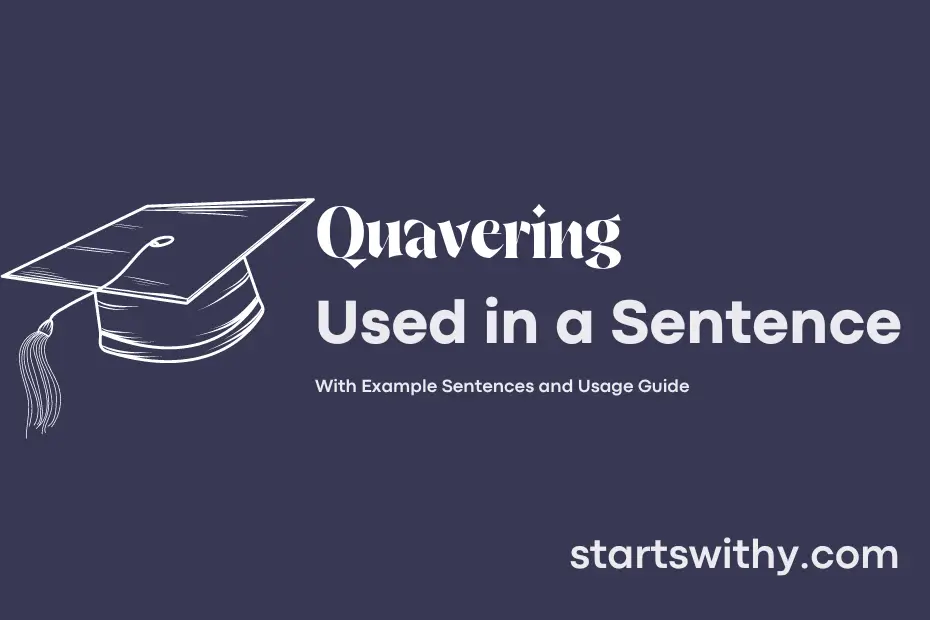Have you ever come across the term “quavering” while reading a piece of literature or listening to a speech? Quavering is a descriptive word used to depict a trembling or shaking quality in someone’s voice or sound.
This term often conveys a sense of vulnerability, uncertainty, or emotion in the speaker, adding depth and nuance to the message being conveyed. Keep reading to explore how writers and speakers use quavering to evoke specific feelings and create a powerful impact on their audience.
7 Examples Of Quavering Used In a Sentence For Kids
- The little bird’s song was quavering as it greeted the morning.
- The rabbit’s tail was quavering as it hopped through the meadow.
- The leaves on the trees were quavering in the gentle breeze.
- The kitten’s meow was quavering as it called for its mother.
- The candle flame was quavering in the dark room.
- The child’s voice was quavering as they sang a lullaby.
- The old man’s hand was quavering as he reached for his walking stick.
14 Sentences with Quavering Examples
- Quavering with nervousness, she delivered her presentation in front of the class.
- His voice was quavering as he asked the professor a question during the lecture.
- Quavering with excitement, she received her acceptance letter from the prestigious university.
- The student’s hands were quavering as he turned in his final exam paper.
- Quavering with anticipation, she opened the envelope containing her exam results.
- The group of friends sat in the cafeteria, their laughter quavering through the bustling room.
- Quavering with uncertainty, he asked his classmate for help with a difficult assignment.
- The tension in the room was palpable, with every word spoken quavering in the air.
- The student’s voice was quavering as she stood up to give a speech at the college event.
- Despite her quavering confidence, she decided to apply for the challenging internship program.
- The late-night study session left her quavering with exhaustion as she tried to focus on her notes.
- His resolve was quavering as he debated whether to drop a difficult course.
- As the deadline approached, the students’ voices grew quavering as they frantically worked on their group project.
- The room fell silent as the professor’s quavering words echoed during the intense debate.
How To Use Quavering in Sentences?
To use the word Quavering in a sentence, it is important to understand its meaning and context. Quavering is often used to describe a voice or sound that is shaking or trembling, typically due to fear, nervousness, or emotion.
Here is an example sentence using Quavering:
- She spoke in a quavering voice as she recounted the story of her narrow escape.
When using Quavering in a sentence, it is essential to ensure that the context fits the definition of the word. Make sure the tone or feeling of the sentence aligns with the shaky or trembling quality associated with Quavering.
It can also be helpful to provide additional context to give a clearer understanding of why the voice or sound is Quavering. For instance, you could describe the situation or emotion that is causing the quavering voice, such as fear, uncertainty, or excitement.
Overall, using Quavering in a sentence can add depth and emotion to your writing by conveying the subtle nuance of a trembling or shaking voice. Experiment with different contexts and scenarios to practice incorporating Quavering effectively into your writing.
Conclusion
In conclusion, sentences with a quavering tone capture emotions like fear, uncertainty, or nervousness through the wavering quality of the speaker’s voice. These sentences often convey vulnerability, revealing a sense of emotional fragility or inner turmoil. The hesitancy and instability in these sentences can evoke empathy and draw listeners closer to the speaker’s emotions, making them powerful tools for conveying complex feelings in a subtle and nuanced way.
Whether expressing anxiety, excitement, or distress, sentences with a quavering quality add depth and authenticity to communication by revealing the speaker’s emotional state. By using quavering sentences effectively, speakers can convey sincerity, vulnerability, and raw emotions that resonate strongly with listeners, fostering connection and understanding in a deeply human way.



